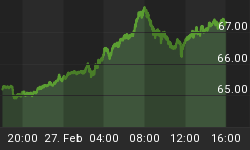With the American bond market being so languid, long-suffering investors have resigned themselves to sub-3 percent yields that the 10-year Treasuries are offering. But not everybody is ready to throw in the towel yet: Some investors have dug their heels in and are willing to purchase ultra-high risk bonds and hope for the best.
For the brave ones, the rewards can be huge.
At 13 percent interest, bonds sold by the state of Venezuela and its oil producer Petroleos de Venezuela (PDVSA) are the highest-yielding in the world, bar none. Venezuelan bond yields can sometimes reach gravity-defying heights:

(Click to enlarge)
Source: TradingEconomics
There's a quid pro quo though: the Venezuelan government is dead-broke and the risk of not being paid is high. In fact, the yield curve by Venezuelan bonds is strongly inverted, implying that there's a very high chance you will not be paid a dime if you purchase short-term bonds such as 2-year and 4-year government notes. Related: China Poised To Overtake U.S. In Artificial Intelligence Race
Venezuelan bonds have been dubbed 'hunger bonds' due to the belief that proceeds from the bond sale only go to support President Nicolas Maduro's regime, while interest payments deprive the country of much-needed foreign exchange to import food for its hungry citizens.

(Click to enlarge)
Source: WorldGovernmentBonds.com
But that hasn’t deterred Wall Street from trying to profit from the situation. Fidelity Investments, T. Rowe Price, BlackRock iShares, Goldman Sachs, Nomura Investments and Invesco Powershares are the top institutional holders of Venezuelan debt.
And so far, it’s worked; at least for Goldman Sachs. The investment banker has reportedly received a $90 million interest payment for PDVSA 2022 VE112689168 bonds that the firm purchased last year.
Either Goldman is lucky or improving oil prices have finally pulled the government out of its deep hole. Last year, the Venezuelan government took the painful step of halting all foreign debt payments leading to the country defaulting on bonds worth $40 billion. Maduro has often been vilified for his willingness to sacrifice the welfare of his people in favor of maintaining the country's international standing.
Venezuela is the world's 11th largest oil producer, pumping out 2.3 million bbl/day. The Latin American country depends on the black commodity for 95 percent of its exports and 25 percent of GDP. Related: Millennials Prefer Cash To Credit Cards
Stubbornly low oil prices over the past three years have wreaked havoc with the country's economy, leading to its present sorry state. Oil prices, though, have enjoyed a sustained recovery since mid-2017 and currently hover at 3-year highs.
WTI (Nymex) Price

(Click to enlarge)
Source: Nasdaq
Are Venezuelan Bonds Worth the Risk?
The Goldman Sachs interest payment gives bondholders whose payments have been in limbo a ray of hope. Fidelity, the biggest institutional holder of the bonds, is the top 401(k) provider in the U.S. with nearly 70 million customers. It therefore appears as if a lot of people have invested their retirement savings in Venezuelan debt.
Some people might take the high road and object to supporting an autocratic government. If your only reason for feeling skittish about Venezuelan bonds is informed by morality issues, then take heart. The U.S. government has barred its citizens from buying newly issued Venezuelan bonds. The only way you can get them is by buying from other traders on the secondary markets, meaning the funds will go to an investment bank on the other side of the transaction--and not Venezuela.
Still, the financial risk of these instruments is just too high. Bonds issued last year have lost nearly three-quarters of their value, and you risk having to sell yours at a loss, too, if the situation in Venezuela fails to improve. If you are already invested, you can find an updated list of the state of your bonds here.
By Alex Kimani for Safehaven.com
More Top Reads From Safehaven.com:
















